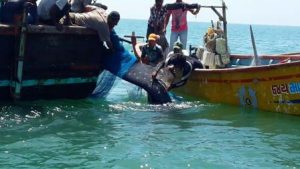A community-led conservation project initiated by Wildlife Trust of India, Tata Chemicals Ltd, and the Gujarat Forest Department has helped the whale shark find a measure of security on the Saurashtra coast where it was once brutally hunted.
From profit to people and to the planet, an effective CSR policy is a vision of this triple-bottom line concept. Maintaining bio-diversity is as important as producing quality products. This philosophy helped Tata Chemicals’ conceptualise the internationally acclaimed Project ‘Whale Shark Conservation’ initiative. Unveiled at Mithapur, Gujarat, the project – the only one of its kind focused on the welfare of the whale shark in India has found pride of place next to the Asiatic Lion on the wildlife map of Gujarat. The project has successfully rescued and released over 601 whale sharks as of July 2016. The fish that was once locally referred to as ‘barrel’ has now become ‘Vhali’, the loved one.
 The Whale Shark Campaign was jointly launched in January 2004 Tata Chemicals, Wildlife Trust of India, International Fund for Animal Welfare, Gujarat Forest Department, the Coast Guard, the Indian Navy, the Ministry of Environment and Reef watch to spread awareness, educate and change perceptions about the fish among specific target groups in the region. This project is currently in its third phase and is being implemented in partnership with the Wildlife Trust of India and the Gujarat State Forest Department with support from the fishing communities of Veraval, Sutrapada and Dhamlej region.
The Whale Shark Campaign was jointly launched in January 2004 Tata Chemicals, Wildlife Trust of India, International Fund for Animal Welfare, Gujarat Forest Department, the Coast Guard, the Indian Navy, the Ministry of Environment and Reef watch to spread awareness, educate and change perceptions about the fish among specific target groups in the region. This project is currently in its third phase and is being implemented in partnership with the Wildlife Trust of India and the Gujarat State Forest Department with support from the fishing communities of Veraval, Sutrapada and Dhamlej region.
Official figures reveal that before 2001, over 150 whale sharks were poached along the Gujarat coast. Independent figures however put this number at 500. Despite the efforts of the rescue team, a large number of whale sharks were dying due to entanglement and stress induced by the extensive travel time taken by the rescue team to reach the site. To speed up the release, a self-photo documentation process was initiated and 1200 water proof cameras were distributed to fishermen in Sutrapada, Dhamlej and Veraval since 2012. The captured images of a rescue by fisher men served as evidence to prove the damage to nets and claim financial relief from the government.
In the next phase of the Whale Shark Conservation programme, India’s first ever whale shark satellite as well as marker tagging programme has been initiated. So far, four whale sharks have been tagged with satellite transmitter and an effort is being made to understand the migratory patterns of the specie. Moreover, more than 132 fishermen were given training on deploying marker tags on the rescued fish that could reveal more about the population.
The project team is now taking the support of professional research institutions to understand the habitat quality of whale sharks and WTI has accordingly signed an MoU with the Indian Institute for Science Education and Research, Kolkata (IISER-K). A collaboration has also been initiated with the Wildlife Institute of India (WII) to understand the molecular make-up of the whale shark based on the genetic analysis of its tissue samples.
Further, the team is taking the Whale Shark Conservation Project from the west coast to the east coast, with support from the Andhra Pradesh Forest Department, EGREE Foundation and IUCN. WTI has finished a Traditional Ecological Knowledge (TEK) investigation of whale shark distribution along the Andhra Pradesh coast and has just initiated the similar survey along the Odisha coast.
The project team also conducts regular awareness activities like painting competitions, quizzes, rangoli etc, reaching out to thousands of students across Gujarat to ensure that future generations become important stakeholders in the whale shark conservation project.
The Way Forward
“We need more information about the behavioural and migration patterns of this species, which enjoys Schedule1 status under the Wild Life (Protection) Act, 1972, but is not studied as much as others in this category”, declares Professor BC Choudhury, Senior Advisor and Project Investigator, WTI.“This is also the reason why so little is known about these magnificent creatures. Science can help us understand them better and draft a conservation strategy that will ensure their survival in the deep blue seas.”
Talking about the over a decade long conservation project, Ms. Alka Talwar, Head, Corporate Sustainability, Tata Chemicals Ltd., said, “WTI and the Forest Department will continue to have Tata Chemicals’ sustained support as we strive to save our natural heritage and help communities to learn more about Whales Shark Conservation. Marine conservation has grown by leaps and bounds in Gujarat, and is the new frontier in conserving nature. As always, Tata Chemicals is committed to the important issues of biodiversity and will continue to take steps in conserving nature and species in the years to come.”

